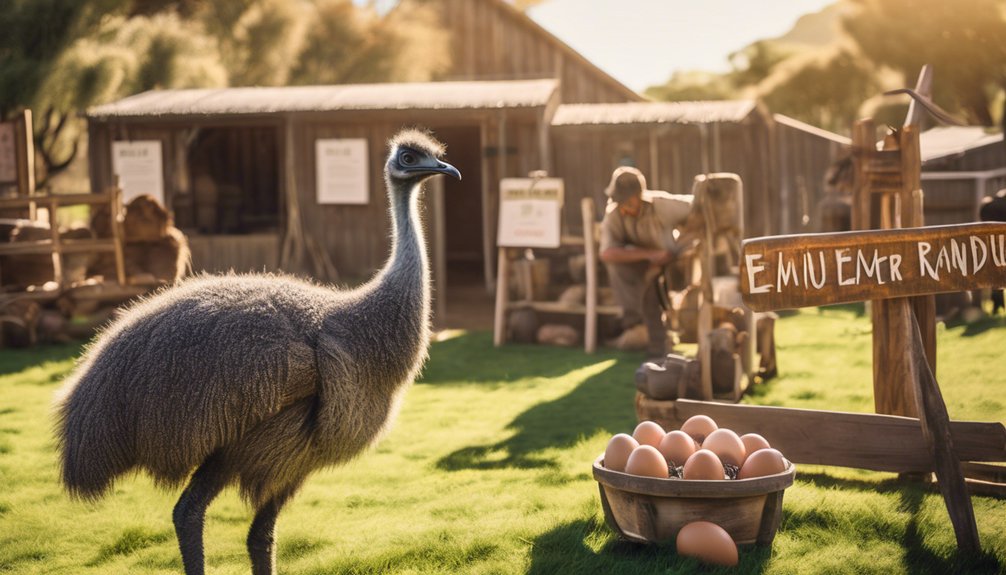
If you're considering emu farming, you're tapping into a unique and rewarding agricultural venture. Understanding the right breed, like the adaptable Australian emu, is just the beginning. You'll also need to establish a suitable environment and focus on nutrition and health management. Each decision you make can significantly impact your success. Are you ready to explore what it takes to create a thriving emu farm? The journey starts here.
Key Takeaways
- Select an appropriate emu breed, considering factors like adaptability, temperament, and growth rates to enhance productivity on your farm.
- Ensure your farm has adequate land, secure fencing, and proper shelter to create a safe and nurturing environment for your emus.
- Invest in essential equipment such as incubators, feeding tools, and healthcare supplies to support the health and growth of your flock.
- Provide a balanced diet with high-quality grains, fresh vegetables, and clean water, adjusting intake as necessary for optimal health.
- Regularly monitor emu health, maintain hygiene, and administer vaccinations to prevent disease and ensure a thriving flock.
Understanding Emu Breeds

When you're diving into emu farming, understanding the different breeds is essential for making informed decisions. Emus share common characteristics, like their large size and distinctive feathers, but various breeds offer unique attributes that can enhance your farming experience.
The most popular emu breeds include the Australian or Standard emu, known for its adaptability and robust health, and the black-necked emu, which features striking plumage. Each breed has its own temperament and growth rates, affecting your farm's productivity.
Setting Up Your Emu Farm
As you embark on the journey of setting up your emu farm, careful planning and consideration are key to ensuring a successful operation.
Start with land selection—choose a space with ample room for your emus to roam and forage. You'll also need to think about fencing requirements, as emus are curious and strong creatures.
Consider the following essentials:
- Open space: At least 2-5 acres for a small flock.
- Secure fencing: 6-foot tall, sturdy fencing to keep them safe.
- Shelter: Provide shaded areas for protection from the elements.
- Water source: Fresh and clean water should be accessible at all times.
With these factors in mind, you'll create a nurturing environment for your emus.
Essential Equipment for Emu Farming

Once you've established a suitable environment for your emus, it's time to focus on the equipment that will support their well-being and your farming efficiency.
First, consider the incubator types you'll need; a reliable incubator is crucial for hatching eggs successfully. Look for models with adjustable temperature and humidity settings.
Next, fencing options are vital for keeping your emus safe. Strong, tall fences prevent them from escaping and protect them from predators. Options like chain-link or welded wire are excellent choices.
Additionally, invest in proper feeding and watering equipment to ensure they get the nutrients they require.
Nutrition and Feeding Requirements
Nutrition plays a pivotal role in the health and productivity of your emus. Ensuring your birds receive the right balance of nutrients is crucial.
Start by choosing appropriate feed types, such as:
- High-quality grains (like oats and corn)
- Nutrient-rich pellets formulated for emus
- Fresh vegetables and fruits for vitamins
- Clean water to prevent dehydration
Incorporating nutritional supplements can further enhance their diet, especially during growth phases or breeding seasons.
Remember, a well-fed emu not only thrives but also contributes to the overall success of your farm.
By closely monitoring their intake and adjusting as needed, you'll foster healthy, productive birds that bring joy and profit to your endeavor.
Keep their diet varied and watch them flourish!
Emu Health and Disease Management

Keeping your emus healthy is essential for their well-being and your farm's success. Regular health monitoring helps you catch any issues early, ensuring your flock thrives. Focus on disease prevention through proper hygiene, vaccination, and nutrition.
Here's a quick reference table for you:
| Health Aspect | Recommendations |
|---|---|
| Vaccination | Administer vaccines as advised by a vet |
| Hygiene | Clean pens regularly to reduce pathogens |
| Diet | Provide balanced nutrition tailored for emus |
| Observation | Watch for signs of illness like lethargy or changes in appetite |
Breeding and Incubation Practices
Successful emu farming hinges on effective breeding and incubation practices that can significantly impact your flock's health and productivity.
To ensure success, consider these key aspects of breeding strategies and incubation techniques:
- Select strong breeding pairs: Choose healthy, robust emus to maximize genetic potential.
- Monitor reproductive cycles: Understanding when your females are ready for mating can improve breeding outcomes.
- Utilize proper incubation methods: Maintain consistent temperature and humidity levels for optimal egg hatching.
- Regularly check egg viability: Candle eggs to assess development and discard any non-viable ones.
Marketing Your Emu Products

How can you effectively market your emu products to stand out in a competitive market? Start by developing strong branding strategies that reflect your unique story and values.
Craft an engaging narrative around your farm and the benefits of emu products, from meat to oil. Identify your target markets—health-conscious consumers, gourmet chefs, or local artisans—and tailor your messaging to resonate with them.
Utilize social media platforms and local events to showcase your products, offering tastings or samples to create personal connections. Collaborate with influencers or fellow artisans to expand your reach.
Legal Considerations and Regulations
Before launching your emu farming venture, it's crucial to understand the legal considerations and regulations that govern the industry.
This knowledge will help you navigate the complexities of starting your farm smoothly. Here are some key aspects to consider:
- Zoning laws: Ensure your property is zoned for agricultural use.
- Permit requirements: Obtain necessary permits for livestock management.
- Health regulations: Familiarize yourself with local health and safety standards for animal husbandry.
- Environmental regulations: Be aware of rules regarding waste management and land use.
Frequently Asked Questions
What Are the Common Predators of Emus on a Farm?
When you raise emus, be aware of common predators like foxes and various bird species. Fox attacks can be particularly damaging, while birds of prey may threaten younger emus. Keeping vigilant helps protect your flock.
How Long Do Emus Typically Live in Captivity?
Did you know emus can live up to 20 years in captivity? With proper emu care, you'll ensure a healthy lifespan. Their longevity highlights the importance of creating a safe, nurturing environment for these fascinating birds.
Can Emus Be Kept With Other Livestock Species?
You'll find emus can coexist with certain livestock species, but their compatibility varies. Monitor interactions closely to ensure harmony, as emus' curious nature may lead to conflicts with more aggressive animals in your pasture.
What Are the Signs of Stress in Emus?
Did you know that nearly 30% of emus show signs of stress in unfamiliar environments? You'll notice behavioral changes like increased aggression or withdrawal, often triggered by environmental factors such as loud noises or cramped spaces.
How Do Weather Conditions Affect Emu Farming?
Weather conditions significantly impact your emu farming. Seasonal changes can affect their health and productivity, while climate impact influences feeding patterns and habitat needs. Adapting to these variations helps ensure your emus thrive year-round.
Conclusion
As you venture into emu farming, you're not just raising birds; you're embracing a journey filled with challenges and rewards. Imagine the thrill of watching your flock flourish under your care, each step bringing you closer to success. But remember, the path isn't without its hurdles. Will you be ready to tackle unexpected obstacles? Equip yourself with knowledge, prepare diligently, and you just might unlock a thriving venture that brings both joy and profit. The future awaits!




